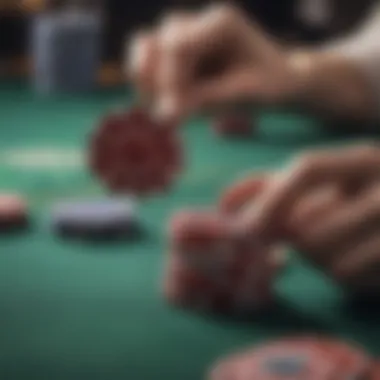Exploring Free Poker Games: Fun and Skills


Intro
Free poker games have become a staple in the online gaming landscape, attracting a diverse player base. Whether you're a novice hoping to hone your skills without draining your wallet, or an experienced player seeking some light-hearted fun, free poker offers a unique avenue for enjoyment and learning. This exploration aims to break down how these games function and the benefits they provide.
In recent years, platforms hosting free poker games have flourished, thanks to advancements in gambling technology and the online gaming community's increasing accessibility. The social aspects of the game can't be overlooked either – connecting with others while playing poker fuels a sense of camaraderie among players.
As we delve into the key game strategies, industry trends, and vibrant communities surrounding free poker, you'll find insights that could potentially elevate your gameplay or simply pique your interest in joining this dynamic world. The beauty of poker lies not only in competition but also in the connections and experiences shared along the way.
"The only way to win at poker is to play, learn, and enjoy the ride."
Game Strategies
Understanding the essential strategies behind poker games can make a significant difference, even when you're playing for free. It’s all about sharpening your instincts and embracing the thrill of the game without the pressure of real stakes. Here are some key components for mastering your gameplay.
Effective Betting Techniques
Betting effectively in poker is akin to fine-tuning an instrument; the right adjustments can lead to a much better outcome. First, it’s essential to know when to fold and when to go all in, even if there's no money on the line. Here are some techniques:
- Position Awareness: Being aware of your position at the table can drastically influence your strategy. Early positions usually require a tighter approach, while late positions give you more freedom to act.
- Bluffing Smartly: Bluffing is a vital part of poker, but it can backfire. Practice timing and reading others’ behaviors to decide the right moment to bluff.
- Value Betting: When you're holding a strong hand, consider betting higher to extract maximum value while avoiding giving away too much information.
Understanding Game Odds
Another fundamental aspect of poker is being able to calculate odds and outs. Knowing the probability of hitting your hand can provide a strategic edge.
- Pot Odds: This metric measures the ratio of the current size of the pot to the amount of money you need to call. Understanding pot odds can help determine if a call is worthwhile.
- Outs Calculation: Knowing how many cards can improve your hand (the outs) can guide your decisions, helping you play the odds effectively during the game.
- Implied Odds: Sometimes, even if the pot odds suggest a call isn’t worth it, the potential future winnings often warrant it. Understanding implied odds adds a layer of depth to your strategy.
By integrating these game strategies into your free poker experience, you'll not only enjoy the thrill of gameplay but also develop invaluable skills that translate to both free and real-money games.
Prelims to Free Poker Games
The world of poker has always been a fascinating realm, attracting players from different backgrounds and prowess. Free poker games are a vital aspect of this universe, offering a unique blend of enjoyment and learning. Instead of focusing solely on monetary stakes, these games emphasize the sheer amusement of the sport and its social dimensions. By understanding the foundations of free poker, players can sharpen their skills and interact with other enthusiasts in a relaxed environment.
When we talk about free poker, it’s not just about the absence of financial risk; it’s about creating an engaging atmosphere where players can experiment with strategies and learn the ins and outs of the game. This makes it important for both newcomers and seasoned players alike. For many beginners, free poker games serve as a safe space to grasp the mechanics of poker without the pressing worry of losing hard-earned cash. Additionally, for the more experienced competitor, these games offer a chance to refine tactics, test new styles, and find out what works best against different types of opponents.
As we dive deeper into the various aspects of free poker, it becomes clear that the allure lies not only in the game itself but also in the connections forged around the poker table. In this article, we will explore this vibrant landscape of free poker, highlighting its various formats, platforms, and the enriching experiences it offers.
Understanding Free Poker
Free poker offers players an opportunity to participate in games without any financial commitments, which is different from traditional poker where real money is at stake. At its core, free poker involves gameplay with fake money or play chips. This can be incredibly appealing, particularly for novices trying to find their footing within the poker community. Being able to play without the fear of losing actual funds means players can focus solely on improving their skills.
On many platforms, free poker is structured similarly to paid games, allowing players to experience true poker strategy without the added pressure. Whether it's Texas Hold'em or Omaha, the rules remain consistent, offering an authentic experience. Players can join in without a significant time commitment or hefty buy-ins, making it easy to fit into diverse schedules. The idea is, if you can get to grips with the fundamentals in a no-stakes environment, you're equipping yourself for success when you eventually decide to play for real money.
The Appeal of Playing for Fun
The charm of playing poker for fun transcends money; it revolves around the uncomplicated joy of engaging in the game itself. For many, the thrill of making a well-timed bluff or executing a perfect strategy offers satisfaction that goes beyond any potential monetary gain. It's a chance to escape routine, dive into an intellectually stimulating activity, and enjoy a sense of community.
Social interaction is another strong advantage of free poker. People come together, share strategies, and build friendships. In many cases, tables filled with laughter and spirited discussions are more rewarding than anything else.
Moreover, playing poker for fun cultivates a sense of resilience. Players learn to cope with losses gracefully, understanding that every hand is a lesson rather than a disaster. The focus shifts from winning money to enjoying the game, which can lead to better retention of skills and an overall more fulfilling experience.
"Playing poker for fun is like dancing at a party; it’s about the joy of the moment, not just the end result."
The various elements of free poker create an environment where learning and enjoyment flourish hand in hand. As we continue this exploration, we'll take a closer look at the different types of free poker games available, the platforms that host them, and the many benefits that underscore their appeal.
Types of Free Poker Games
Understanding the various types of free poker games is crucial for anyone looking to immerse themselves in the world of poker without the risk of losing real money. These different formats not only cater to varied preferences but also provide unique environments for learning and socializing. Each type has its own set of strategies, player interactions, and levels of competition, making it essential for players to find the right fit for their style and objectives.


Cash Games
Cash games are often seen as the backbone of poker gaming. Here, players exchange chips for a real dollar value, enabling them to enter or exit when they please. Each hand played allows players to win or lose money based on their actions. This freedom of movement attracts those who relish the thrill of gambling without having to commit to long play sessions.
In a cash game, players can start with a small bankroll and increase their investment based on confidence or skill level. Just like the saying goes, "you gotta spend money to make money"; being smart with your stack management here is vital. Play too conservatively, and you could miss opportunities, but being overly aggressive can also send your chips flying out the door.
Tournaments
Tournaments introduce a different flavor to the poker experience. Players pay a fixed entry fee for a chance to compete against a larger field for a collective prize pool. As the tournament progresses, blinds increase, requiring players to adapt their strategy on the go.
One standout element of tournaments is the structure itself — they can stretch over hours, even days, dragging you into the heart of intense competition. Unlike cash games, where players can leave at any time, tournaments demand endurance and mental fortitude. A successful tournament player often embodies traits like patience and adaptability, as the dynamic nature of the game tests one’s skills in many ways.
Sit and Go Games
Sit and Go games occupy a unique niche between cash games and larger tournaments. Typically starting as soon as a designated number of players join — usually 6 or 10 — they allow for relatively quick engagements. These games can be completed in under an hour, making them an excellent option for players short on time.
The beauty of Sit and Go games lies in their flexibility. Players can enjoy a fast-paced environment, practicing strategies without needing a long-term commitment. Additionally, because the structure is tournament-based, it brings in competitive elements without the drawn-out nature of bigger events.
Play Money Games
For many novices, play money games provide an excellent entry point into the poker world. Offering the ability to learn the ropes without any financial risk, these games enable players to experiment with new strategies, understand the game mechanics, and gain confidence.
While the stakes may not be real, the experience can be invaluable. Players often engage in real tactics and hands-on learning similar to real-money situations, albeit without the pressure associated with betting. It’s often said that practice makes perfect; therefore, play money games can act as a training ground before diving into real stakes.
In summary, recognizing these types of free poker games unlocks avenues for participation that suit various skill levels and personal preferences. Whether you're trying your luck at cash games or honing your skills in play money games, each format encourages growth and enjoyment in the intricate world of poker.
Platforms Offering Free Poker
When diving into the world of free poker games, the platforms where these games are hosted plays an essential role. Understanding where you can access these games gives players a broader perspective on their options and helps in making informed choices. The variety of platforms not only influences gameplay experience but also shape social dynamics and learning opportunities. Each platform comes with its own set of unique characteristics, catering to different types of players. Below, we break down several prominent platforms offering free poker.
Online Poker Rooms
Online poker rooms are perhaps the most well-known venues for free poker games. Sites like PokerStars and 888poker allow users to join games at no cost, giving them a chance to practice their skills without risking real cash. What’s particularly appealing here is the sheer variety of games available — from Texas Hold'em to Omaha, players can choose what they feel comfortable with.
Additionally, many of these rooms also host regular free tournaments to keep the competition fresh and engaging. These tournaments help players gauge their skills against others, a useful tool for learning and improvement without financial pressure.
Mobile Applications
In today's fast-paced world, mobile applications have revolutionized how players engage with poker. Apps like Zynga Poker and Poker Heat provide a user-friendly interface, allowing players to enjoy games anytime, anywhere. The convenience factor cannot be overstated; whether waiting in line or lounging at home, a quick game is always a finger swipe away.
Moreover, many mobile applications incorporate social features such as chat functions and friend invitations, enhancing the community aspect of poker. Players often find themselves reconnecting with friends while enjoying some light competition.
Social Media Platforms
Social media platforms, while not traditionally associated with poker, have carved out their own niche for hosting free games. Platforms such as Facebook offer various poker games that encourage player interaction in a casual environment. Users can create private tables for friends or join large communities to meet new players.
Playing on social media facilitates a laid-back atmosphere and removes much of the formality seen in online poker rooms. This makes the game more accessible for newcomers, allowing them to learn the ropes while enjoying a social experience.
*"Playing for fun often leads to unexpected friendships and memorable moments, making the game just as rewarding as competition.
Home Games with Friends
Sometimes, the best poker games happen in the comfort of one's own home. Organizing a home game can be a fun and interactive way to gather friends, sharing laughs, banter, and great memories. Whether using a physical deck of cards or online platforms to facilitate the game, the vibe is usually more relaxed.
Home games provide an unrivaled atmosphere for social interaction, where players can learn from one another in real time. Organizing these games helps build camaraderie, and collecting chips while enjoying snacks can transform a simple gathering into a memorable poker night.
By carefully navigating these platforms, poker enthusiasts can discover which environment best suits their playing style and preferences. Each platform comes with its own perks, providing both fun and opportunities for growth within the game.


Benefits of Playing Free Poker
Playing free poker offers a wealth of advantages that extend far beyond just having a good time. Understanding these benefits can help players, both seasoned and new, make the most of their poker experience. When engaging in poker for fun, several elements come into play, including improvement in skills, an absence of financial risk, and valuable opportunities for social engagement.
Skill Development
One primary perk of indulging in free poker games is the chance to hone one’s skills without the pressure of losing actual money. In these environments, players can experiment with strategies, test different playing styles, and learn from their mistakes without fearing their wallets will take a hit.
Familiarity with hand rankings and play strategies becomes second nature when players can practice freely. For example, a newcomer can try their hand at a variety of tables, observing experienced players and taking notes on their moves. Over time, this exposure provides invaluable insights into different playing styles and techniques that can boost overall performance.
Additionally, many apps and platforms offer tutorials and simulated environments. These educational tools bridge the gap between theoretical knowledge and practical application, making skill-building accessible to all.
Risk-Free Environment
The absence of financial risk when playing free poker is another significant benefit. Knowing that there’s no money on the line allows players to focus purely on the enjoyment of the game. This reduces anxiety and allows one to enjoy poker without the fear of significant losses. The no-pressure format fosters a relaxed atmosphere where players can fully immerse themselves in the dynamics of the game.
Moreover, free poker serves as a perfect introduction for those hesitant to join real-money games. New players can feel overwhelmed in a high-stakes setting. Free environments cultivate confidence, allowing players to gradually transition into more competitive formats when they feel ready. The thought of potentially losing money in a live game can deter many, yet the allure of poker can be hard to resist. The risk-free environment clears those hurdles.
Social Interaction
Lastly, one cannot overlook the social aspect of playing free poker. Engaging with a diverse player base, often from different backgrounds, fosters camaraderie and connection. Whether it’s in a cozy home game or a lively online room, poker brings people together.
Chat features available in many online platforms encourage conversation, making the experience not just about cards but about community. Players share stories, strategies, and laughter, creating an enjoyable atmosphere. This social element speaks volumes; for many, it’s the friendships formed that keep them coming back for more.
"In many ways, poker mirrors life. It's a mix of skill and luck, but the connections you create are what truly matter."
The benefits gleaned from free poker extend into personal growth and social well-being. It’s an environment that allows for growth, learning, and the cultivation of friendships while enjoying the game we all love.
Strategies for Success in Free Poker
The beauty of free poker games is that, unlike traditional poker, there’s no financial stake involved. This provides a unique chance to hone strategies, develop a keen understanding of the game, and immerse oneself in the social aspects of poker without the heavy weight of risk. Players can leverage these opportunities to sharpen their skills and experiment with different tactics.
When it comes to excelling in free poker, understanding certain key strategies can make a significant difference. Not only do these strategies elevate the enjoyment of the game, but they also set a solid foundation for transitioning to real-money situations if desired.
Understanding Hand Rankings
To navigate the world of poker effectively, knowledge of hand rankings is fundamental. Being familiar with what constitutes a strong hand versus a weak one is the first step toward making informed decisions. Here's a simplified breakdown of common hand rankings from highest to lowest:
- Royal Flush: A, K, Q, J, 10, all of the same suit.
- Straight Flush: Five consecutive cards of the same suit.
- Four of a Kind: Four cards of the same rank.
- Full House: Three of a kind plus a pair.
- Flush: Five cards of the same suit, not in sequence.
- Straight: Five consecutive cards in any suit.
- Three of a Kind: Three cards of the same rank.
- Two Pair: Two pairs of different ranks.
- One Pair: One pair of the same rank.
- High Card: When no one has a significant hand, the highest card wins.
Familiarizing oneself with these rankings is crucial because it impacts betting strategies and decision-making during gameplay. Knowing when to bluff or fold can hinge on understanding where your hand stands in relation to others at the table.
Reading Opponents
In free poker, reading your opponents becomes a pivotal skill. Observing their betting patterns, demeanor, and reactions can divulge much about their hands. Are they playing conservatively, or do they tend to be aggressive? This behavioral insight can help you make strategic calls or folds.
Here are a few tips to effectively read your opponents:
- Look for Patterns: Players often develop consistent strategies. Keep an eye on how often they bet, raise, or fold.
- Observe Body Language: In live settings, watch for physical tells, like nervous gestures or relaxed postures.
- Take Note of Betting Sizes: Large bets might indicate strong hands, while smaller bets can signify weakness.
- Use Player History: If you’ve played with the same group before, recall past behaviors to inform your current gameplay decisions.
Managing Bankroll in Free Games
Although there’s no real money involved in free poker, managing your virtual bankroll still holds value. This practice cultivates financial discipline and mirrors strategies used in real-money games. Here are some considerations for effective bankroll management in free poker:
- Set Limits: Even in free games, decide how long you want to play or how many hands to engage with. This helps maintain focus and prevents burnout.
- Track Performance: Keep a mental note of your wins and losses, even in a fun setting. This self-awareness is key to recognizing trends in your play.
- Play for the Experience: Use the lack of financial pressure to explore different styles and strategies. Try out aggressive play or varying positions without the fear of losing money.
By proactively applying these strategies in free poker, players can not only enhance their gaming experience but also prepare themselves for future challenges in competitive environments. Free poker games serve as an excellent training ground, allowing individuals to master tactics, understand social dynamics, and ultimately, enjoy the complexities of the game.


Community and Social Dynamics
In the colorful arena of free poker games, the notion of community and social dynamics is a key layer that often doesn’t get the spotlight it deserves. These games aren’t just about shuffling cards and betting chips; they cultivate bonds, foster friendships, and create a sense of belonging. When players engage in poker, they’re not merely competing against each other—they’re partaking in a collective experience that can be both enriching and enlightening.
The social aspect of poker can be a real game changer. Whether you’re in a physical setting with friends or logging onto an online platform, the interactions you have can enhance your enjoyment. In fact, many players report that the relationships they build during games can extend beyond the poker table, blossoming into meaningful friendships that make the gaming experience all the more delightful.
Moreover, understanding the social dynamics at play is crucial for anyone looking to navigate the world of free poker effectively. It’s not always about card counting; knowing how to connect with other players can make for a much more rewarding experience.
Building Connections Through Poker
When people sit down to play poker, they enter an unwritten realm of connection that transcends age, background, and skill level. Games of poker often serve as the backdrop for camaraderie and rapport. Imagine gathering around a table, the air thick with laughter and lighthearted banter while players share stories of past games or their favorite hands.
Many players discover that they share common ground with acquaintances from different walks of life. You might be surprised to find a lawyer discussing strategies with a college student or a retiree sharing tips with a novice. This melting pot of personalities can lead to deep and lasting friendships that make the game as enjoyable as any victory itself.
Some players turn to online platforms specifically designed for free poker, where chat features allow for real-time interactions. These digital neighborhoods can enhance your experience by giving you the opportunity to engage with players from around the globe. Just a few friendly words can transform an ordinary game into a memorable encounter.
Poker Etiquette in Non-Competitive Settings
Even within the fun and friendly sphere of free poker, etiquette holds significant importance. Understanding how to conduct oneself at the table reflects not only on the individual but also on the game itself. Good manners can help avoid an unpleasant atmosphere, turning a simple session into a delightful gathering.
Some fundamental etiquette tips include:
- Respect the Table: Always treat each player with respect, regardless of their skill level or experience.
- Play at a Comfortable Pace: Keep the game flowing smoothly by taking your time with decisions, but don’t overthink to the point of delaying enjoyment for others.
- Maintain a Positive Attitude: Losing is part of the game. Staying positive can influence fellow players and enhance the group's overall experience.
Players should also be mindful of table talk. Engaging in discussions is great, but make sure to keep the conversation light and inclusive—nobody enjoys feeling left out. Silence can be golden too; sometimes, just enjoying the game and the company is what makes the experience so fantastic.
In summary, the community and social standing in free poker games generally bring extra life to the tables. Players come together, not only to compete but also to forge connections and create a friendly atmosphere where people can enjoy the game and each others’ company. As with any form of play, it’s the connections and shared moments that often resonate long after the cards have been stacked away.
Remember, poker is more than just a game of cards; it’s a social experience that can lead to friendships and a sense of community that is hard to replicate elsewhere.
As players embrace the dynamics of the poker community, they’re not just practicing strategies—they're weaving a tapestry of shared experiences that enrich their lives in unexpected ways.
Free Poker and Gamification
The intersection of free poker games and gamification has become a lively topic of discussion among players. It speaks volumes about how this blend contributes to the appeal of poker in a fun-centric environment. Gamification refers to the integration of game-like elements into non-gaming contexts, which enhances user engagement and enjoyment. In the realm of free poker, this fusion creates a vibrant backdrop where players can immerse themselves without the pressures that come with wagering real money.
One of the most notable benefits of gamification in free poker is the ability to create a more enjoyable experience. Players are often drawn to various forms of entertainment due to intrinsic motivations like happiness and excitement. When elements such as challenges, levels, and leaderboards are incorporated, they not only cater to these desires but also instill a sense of accomplishment. The satisfaction derived from completing challenges or reaching new levels can significantly enhance a player's enjoyment of poker, making it much more than just a card game.
Moreover, gamification can bolster learning opportunities within a relaxed setting. Many players approach free poker with the aim to polish their skills, and the gamified aspects provide an ideal environment for practice. Without the fear of losing money, players can take risks, try new strategies, and experiment with different styles of play, all while enjoying a more engaging format.
Consider that poker, at its core, is a game of strategy and skill. The introduction of gamification can elevate this experience:
- Points Systems: Players earn points for completing specific actions, such as winning a hand or successfully bluffing an opponent.
- Badges and Achievements: Visual symbols that demonstrate a player's achievements in different areas, like ‘Master Bluffer’ for tricking opponents or ‘Rookie Champion’ for mastering beginner games.
- Leaderboards: Encouraging a friendly competitive spirit and allowing players to see how they stack up against peers.
By embedding these fun aspects, free poker becomes more than just a pastime; it transforms into a delightful challenge that players are eager to participate in repeatedly. The importance of casual enjoyment in poker should not be underscored—players often seek fun as much as they desire competition.
"Gamification doesn't just make things fun; it turns learning into an adventure while players engage in poker at their own pace."
In essence, integrating gamification into free poker serves dual purposes: enhancing entertainment and aiding skill development. Understanding this can reshape how players approach these games, encouraging novices to join the fun while giving seasoned players a new canvas to explore their craft.
End
Reflecting on the world of free poker games, it’s clear that these platforms offer more than just a casual pastime. They create an environment where players from various backgrounds converge, sharpening their skills and expanding their social circles. This article has highlighted important aspects that enrich the experience of playing poker without monetary stakes. The sense of community, the absence of financial pressure, and the focus on skill development stand out as key benefits.
The Future of Free Poker Games
Looking down the road, the future of free poker games seems bright. With technology constantly evolving, new innovations are likely to emerge. Players might see enhanced graphics, sophisticated algorithms for matchmaking, and even platforms utilizing virtual reality. These will not only make the games visually appealing but also deepen the immersive experience.
Moreover, the ongoing popularity of eSports has sparked interests in poker as a competitive sport without monetary rewards. As more players seek to refine their skills in a stress-free setting, online communities will likely grow.
In a landscape where competition meets camaraderie, free poker games stand as a testament to the joy of the game itself.
Beyond mere entertainment, these games have the potential to evolve into training grounds for aspiring professionals and beacons of social interaction. In a way, poker has transformed into more than just a card game; it has become a means to connect, learn, and share.
To wrap it up, free poker games for fun are not just about the cards dealt; they shape relationships, hone strategies, and lay the groundwork for future endeavors in the world of poker.







